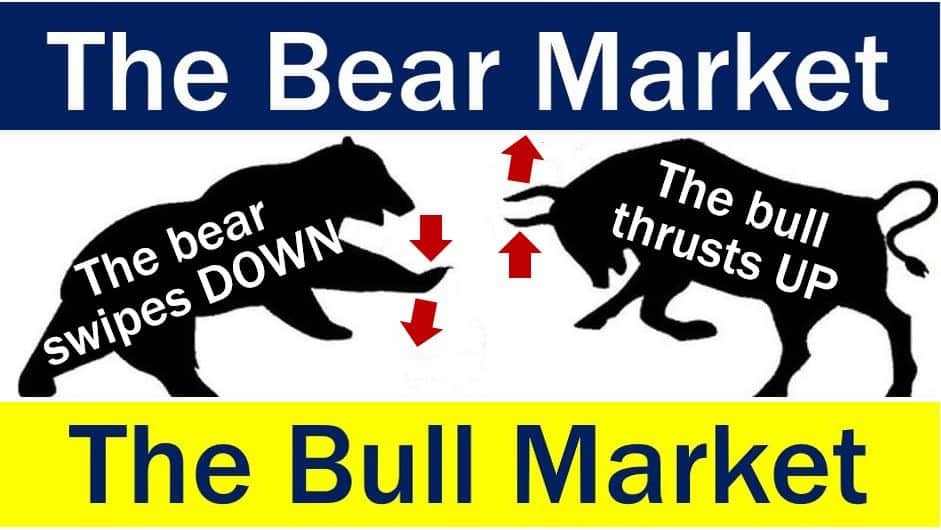A bear market is a market in which the prices of stocks or bonds are falling. In fact, a bear market could describe any market, including oil or real estate, if the prices are declining.
A bull market, on the other hand, is the opposite. In a bull market, the price trend is upwards.
So, why do we say bear and bull markets? It is all to do with how the two animals attack, some people claim. While bears swipe down with their paws, bulls thrust upwards with their horns.
The ‘bear market’ could also have come from the London bear skin jobbers. Jobbers were people who sold bear skins. However, they sold the skins before catching bears. Jobbers’ actions clashed with the French saying ‘don’t sell bear skins before you have killed the bear.’ The French expression, which was like ‘Don’t count your chickens,’ was a caution against over-optimism.

By 1721, during the time of the South Sea Bubble, the bear was linked to short selling. Jobbers sold bears they did not own expecting prices to fall. Subsequently, they could buy them later on at a greater profit.
If you are bearish, it means you are pessimistic about the market. However, if you feel bullish, you are optimistic.
One of the most famous bear markets in history was the Great Depression of the 1930s.
What causes a bear market?
Simply put, a bear market occurs when there are more sellers than buyers. In any free market system, when supply exceeds demand, prices fall. In a bear market, for example, the sellers are the supply, while the buyers are the demand.
Hence, when the market is bearish, seller numbers are high, but buyer numbers are comparatively low.
How does one know when this is about to happen? Predicting whether markets will rise or fall is extremely difficult. In fact, most experts say it is impossible.
However, understanding what factors shape the market can help. We know that three situations cause a bear market:
- First, a rapid rise in the inflation rate.
- Second, high unemployment rates.
- Third, an economy that is entering a recession.
There are also psychological factors, such as our herd instinct. For example, if some investors see many others selling, they may do so too. Then others hear that the first and second group of investors were selling, and do the same, etc.

Invest in a bear market
How can you reduce your exposure when there is a bear market? One way is to sell all your shares and buy short-term government bonds. In other words, get rid of your investments in securities and find safer options.
However, it is possible to continue investing in shares during a bear market. For example, blue chip companies with impressive profits are more likely to do well in any economic climate.
In this article, the term ‘economic climate‘ means ‘economic conditions.’
When the stock market trend is downward, you should avoid smaller companies. Above all, stay away from start-up companies. Companies that are just starting don’t usually have the financial security to withstand poor market conditions.
In a market full of bears, we call a solitary bull a contrarian investor. Likewise, a solitary bear in a market full of bulls is also a contrarian investor.
When prices are either stagnant or falling slightly, investor uncertainty may grow. This can lead to too many sell orders and too few buy orders. We often refer to this situation as a heavy market.
